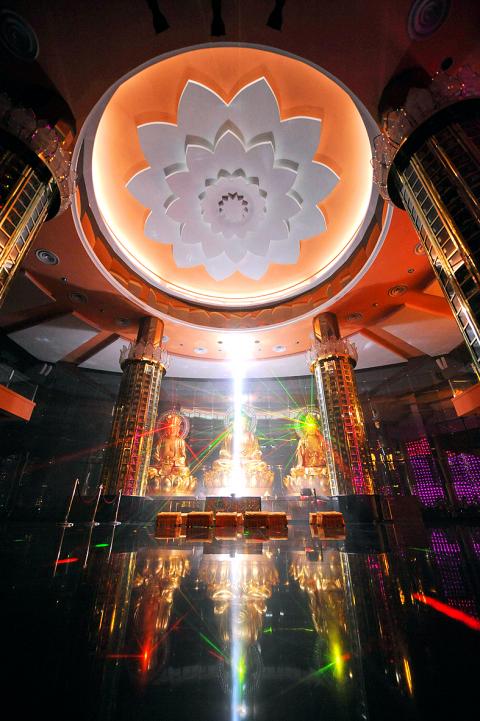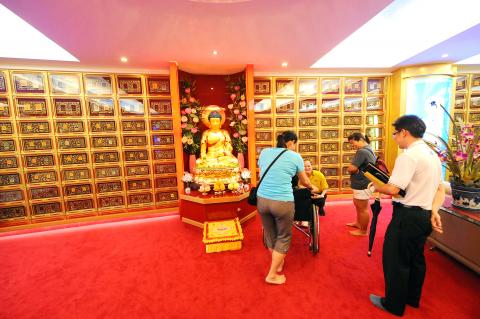Funerals are normally somber affairs, but at the Nirvana Memorial Garden in Singapore mourners could be forgiven for thinking they had strayed into a luxury hotel with a mystical Asian theme.
The self-proclaimed “six star” columbarium, where families can store the ashes of their loved ones for a fee, offers a modern and lavish twist to the ancient tradition of honoring the dead.
At a recent ceremony in a dark, cavernous auditorium, a deep male voice intoned in Mandarin: “I will live on happily in your image and always remember you.”

PHOTO: AFP
Green and red laser beams shot out from the foreheads of three 10m tall gold-plated Buddhas as soothing chants and ambient music played from cinema-quality loudspeakers.
Suddenly, a beam of pure white light from above illuminated the main attraction: An urn containing the ashes of a recently cremated person, sitting on a revolving pedestal shaped like a lotus flower.
The 13,000m2 center is the biggest and most ambitious project by Malaysia-based columbarium operator Nirvana.

PHOTO: AFP
From the “check-in” to the long-term stay, the company, which operates smaller projects in Taiwan, Indonesia, Cambodia and Vietnam, consciously replicates the feel of a top hotel.
“Actually it’s not for the dead people, it’s more for the live people,” said Phang Siang Yang, Nirvana’s country head in Singapore, a largely ethnic Chinese society with a rich, but rapidly aging population.
“We encourage the next generation to always come and visit and pray,” he said, adding that it was important that descendants of the dead “won’t feel that this is an eerie or scary place.”
Entering the lobby of one of the center’s two blocks, one is greeted by a giant gold-plated Buddha statue towering over a water feature.
Cream-colored leather sofas are arranged in accordance with feng shui — the Chinese belief that positions of objects directly affect fortune.
Inside the complex, gold-plated niches, Buddha statues and ancestral tablets await the ashes of the departed in fully air-conditioned “suites” complete with carpeted floors and sofas.
As in hotels, customers are issued magnetic swipe cards which open electronic doors and switch on lights designed to produce a soft, warm glow.
The services do not come cheap.
Charges range from a one-off fee of US$2,880 for an “economy” suite with a single niche to US$167,380 for a “royal” suite that can house an entire family’s ashes.
Revenues now stand at about US$1.5 million per month, barely a year and a half after it started full-scale operations, marketing manager for Nirvana in Singapore Jessie Ong said.
To date, roughly 50 percent of the columbarium’s 7,518 niche lots have been taken up.
A third block will be completed in the next phase of development.
“We’re still seeing the potential,” Phang said. “I think within another few years’ time, the aging population will reach about 20 percent.”
As a result of its low birth rate, close to nine percent of Singapore’s population was aged 65 years and older last year, with the proportion expected to rise to 20 percent by 2030, according to official statistics.
Phang also wants to promote Nirvana Singapore as a tourist attraction and plans to furnish a mini-gallery with Buddhist relics.
A landscaped garden decorated with stone tablets engraved with early forms of Chinese calligraphy and a temple with an elaborate lighting display are also in the works.
“This is our vision, that this place becomes a tourist attraction and temple,” Phang said with a smile.

Taiwan’s long-term economic competitiveness will hinge not only on national champions like Taiwan Semiconductor Manufacturing Co. (TSMC, 台積電) but also on the widespread adoption of artificial intelligence (AI) and other emerging technologies, a US-based scholar has said. At a lecture in Taipei on Tuesday, Jeffrey Ding, assistant professor of political science at the George Washington University and author of "Technology and the Rise of Great Powers," argued that historical experience shows that general-purpose technologies (GPTs) — such as electricity, computers and now AI — shape long-term economic advantages through their diffusion across the broader economy. "What really matters is not who pioneers

In a high-security Shenzhen laboratory, Chinese scientists have built what Washington has spent years trying to prevent: a prototype of a machine capable of producing the cutting-edge semiconductor chips that power artificial intelligence (AI), smartphones and weapons central to Western military dominance, Reuters has learned. Completed early this year and undergoing testing, the prototype fills nearly an entire factory floor. It was built by a team of former engineers from Dutch semiconductor giant ASML who reverse-engineered the company’s extreme ultraviolet lithography (EUV) machines, according to two people with knowledge of the project. EUV machines sit at the heart of a technological Cold

TAIWAN VALUE CHAIN: Foxtron is to fully own Luxgen following the transaction and it plans to launch a new electric model, the Foxtron Bria, in Taiwan next year Yulon Motor Co (裕隆汽車) yesterday said that its board of directors approved the disposal of its electric vehicle (EV) unit, Luxgen Motor Co (納智捷汽車), to Foxtron Vehicle Technologies Co (鴻華先進) for NT$787.6 million (US$24.98 million). Foxtron, a half-half joint venture between Yulon affiliate Hua-Chuang Automobile Information Technical Center Co (華創車電) and Hon Hai Precision Industry Co (鴻海精密), expects to wrap up the deal in the first quarter of next year. Foxtron would fully own Luxgen following the transaction, including five car distributing companies, outlets and all employees. The deal is subject to the approval of the Fair Trade Commission, Foxtron said. “Foxtron will be

INFLATION CONSIDERATION: The BOJ governor said that it would ‘keep making appropriate decisions’ and would adjust depending on the economy and prices The Bank of Japan (BOJ) yesterday raised its benchmark interest rate to the highest in 30 years and said more increases are in the pipeline if conditions allow, in a sign of growing conviction that it can attain the stable inflation target it has pursued for more than a decade. Bank of Japan Governor Kazuo Ueda’s policy board increased the rate by 0.2 percentage points to 0.75 percent, in a unanimous decision, the bank said in a statement. The central bank cited the rising likelihood of its economic outlook being realized. The rate change was expected by all 50 economists surveyed by Bloomberg. The